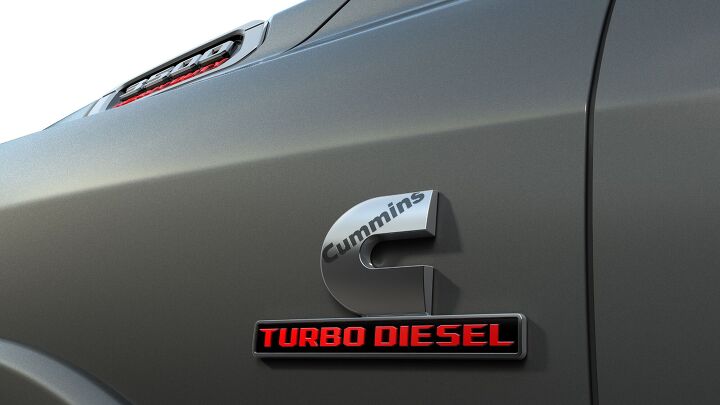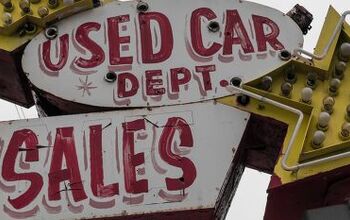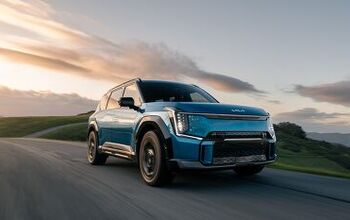Cummins Agrees to Pay $1.6 Billion in U.S. Emissions Fines

The United States Department of Justice has accused Cummins of installing emissions defeating devices on diesel motors and decided to fine the company $1.67 billion for violating the Clean Air Act. Cummins has agreed to pay the fine in principle, which Attorney General Merrick Garland said would resolve any allegations that the "company unlawfully altered hundreds of thousands of engines” to circumvent emissions regulations.
“The types of devices we allege that Cummins installed in its engines to cheat federal environmental laws have a significant and harmful impact on people’s health and safety,” Garland stated, adding that "preliminary estimates suggest that defeat devices on some Cummins engines have caused them to produce thousands of tons of excess emissions of nitrogen oxides."
The Justice Department has alleged that Cummins installed devices that allowed the engines to pass emissions during testing. But said those same devices allowed the vehicles increased performance during regular use — increasing pollution and violating the Clean Air Act.
Claims state that Cummins may have installed the units on roughly 630,000 motors equipped to Ram 2500 and 3500 pickups from the 2013-2019 model years. Another 330,000 taboo emissions controlling devices were also said to have been installed on newer diesel pickups built through 2023. It apparently performed the same function but was of a different design as the unit installed on older trucks.
Cummins is expecting to take a $2 billion loss this quarter from the fallout (which includes recalls) and will undoubtedly continue spending through 2024 as it settles the fine issued by the DOJ. But it has not admitted guilt, nor will it need to now that it has agreed to pay off the government.
"The company has seen no evidence that anyone acted in bad faith and does not admit wrongdoing," Cummins stated.
Environmental Protection Agency Administrator Michael Regan praised the Justice Department’s actions. The EPA head stated that "vulnerable communities are more likely to reside near highways where these harmful emissions are concentrated, making this agreement critical to advancing our environmental justice agenda."
Viewed from an emissions standpoint, it’s hard to make a case for diesel motors. We can visibly see them emitting more pollution than vehicles equipped with gasoline engines, though Europe had previously championed diesels as the cleaner option and even subsidized them due to diesel emitting less carbon dioxide. Still, particulate matter output tends to be significantly higher and has been attributed to exacerbating respiratory illnesses.
Things get a little more complicated when you take a wider view of the issue, however. Diesel engines tend to be highly efficient, resulting in lower average fuel consumption, and are typically longer lived than their gasoline counterparts. Simply keeping an older vehicle around usually results in less pollution than supplanting it with a newer model that happens to be more efficient. Physical waste is still waste and building new vehicles (including all-electric models) results in additional emissions spewing out of the required factories.
While we are a far cry from claiming that diesels are clean, the issue is more nuanced than many would have you believe.
It may not even be possible for modern diesel motors to pass emissions anymore. Whenever I ask engineers why so many automakers have pivoted away from offering diesel motors, the answer usually involves how difficult it is for them to pass modern emissions requirements. This may even have contributed to the rash of emissions cheating we’ve seen since 2015, when Volkswagen was likewise faulted for installing defeat devices.
Companies spend a fortune developing engines and need to keep them in service for a while to recoup the expense. But that’s tricky when a motor that was compliant a couple of years ago and needs to remain in production several more years cannot meet emission standards as they change. This leaves the impacted manufacturers with a few options.
Businesses can neuter the motors in an attempt to appease regulators. But this annoys the customer base and diesel owners have already had it with Diesel Exhaust Fluid (DEF), restrictive exhaust systems, and modern particulate-sensing equipment complicating what used to be very simple powertrains. Businesses can also try to get around emissions testing and simply hope they don’t get caught. Ironically, with the exorbitant amount of money required to develop new engines, it may actually be more cost effective for large manufacturers to simply cheat and pay the fine later.
Cummins’ agreement in principle is with the U.S. and the State of California. The settlement is still subject to final approvals before everything can be squared away.
[Image: Stellantis]
Become a TTAC insider. Get the latest news, features, TTAC takes, and everything else that gets to the truth about cars first by subscribing to our newsletter.

A staunch consumer advocate tracking industry trends and regulation. Before joining TTAC, Matt spent a decade working for marketing and research firms based in NYC. Clients included several of the world’s largest automakers, global tire brands, and aftermarket part suppliers. Dissatisfied with the corporate world and resentful of having to wear suits everyday, he pivoted to writing about cars. Since then, that man has become an ardent supporter of the right-to-repair movement, been interviewed on the auto industry by national radio broadcasts, driven more rental cars than anyone ever should, participated in amateur rallying events, and received the requisite minimum training as sanctioned by the SCCA. Handy with a wrench, Matt grew up surrounded by Detroit auto workers and managed to get a pizza delivery job before he was legally eligible. He later found himself driving box trucks through Manhattan, guaranteeing future sympathy for actual truckers. He continues to conduct research pertaining to the automotive sector as an independent contractor and has since moved back to his native Michigan, closer to where the cars are born. A contrarian, Matt claims to prefer understeer — stating that front and all-wheel drive vehicles cater best to his driving style.
More by Matt Posky
Latest Car Reviews
Read moreLatest Product Reviews
Read moreRecent Comments
- NJRide A question and a point:1) What were hybrids at compared to last year? And plug in bs a regular hybrid?2) How can state governments like mine possibly think 40 percent of sales will be electric in 3 years?
- Steve S. Steve was a car guy. In his younger years he owned a couple of European cars that drained his bank account but looked great and were fun to drive while doing it. This was not a problem when he was working at a good paying job at an aerospace company that supplied the likes of Boeing and Lockheed-Martin, but after he was laid off he had to work a number of crummy temp jobs in order to keep paying the rent, and after his high-mileage BMW was totaled in an accident, he took the insurance payout and decided to get something a little less high maintenance. But what to get? A Volkswagen? Maybe a Volvo? No, he knew that the parts for those were just as expensive and they had the same reputation for spending a lot of time in the shop as any other European make. Steve was sick and tired of driving down that road."Just give me four wheels and a seat," said Steve to himself. "I'll buy something cooler later when my work situation improves".His insurance company was about to stop paying for the rental car he was driving, so he had to make a decision in a hurry. He was not really a fan of domestics but he knew that they were generally reliable and were cheap to fix when they did break, so he decided to go to the nearest dealership and throw a dart at something.On the lot was a two year old Pontiac Sunfire. It had 38,000 miles on it and was clean inside and out. It looked reasonably sporty, and Steve knew that GM had been producing the J-car for so long that they pretty much worked the bugs out of it. After taking a test drive and deciding that the Ecotec engine made adequate power he made a deal. The insurance check paid for about half of it, and he financed the rest at a decent rate which he paid off within a year.Steve's luck took a turn for the better when he was offered a job working for the federal government. It had been months since he went on the government jobs website and threw darts at job listings, so he was surprised at the offer. It was far from his dream job, and it didn't pay a lot, but it was stable and had good benefits. It was the "four wheels and a seat" of jobs. "I can do this temporarily while I find a better job", he told himself.But the year 2007 saw the worst economic crash since the Great Depression. Millions of people were losing their jobs, the housing market was in a free fall, people were declaring bankruptcy left and right, and the temporary job began to look more and more permanent. Steve didn't like his job, and he hated his supervisors, but he considered himself lucky that he was working when so many people were not. And the federal government didn't lay people off.So he settled in for the long haul. That meant keeping the Sunfire. He didn't enjoy it, but he didn't hate it either, and it did everything he asked of it without complaint.Eventually he found a way to tolerate his job too, and he built seniority while paying off his debts. There was a certain feeling of comfort and satisfaction of being debt-free, and he even began to build some savings, which was increasingly important for someone now in their forties.Another bit of luck came a few years later when Steve's landlord decided to sell the house Steve was renting, at the bottom of the housing market, and offered it to Steve for what he had in it. Steve's house was small and cramped, and he didn't really like it, but thanks to his savings and good credit he became a homeowner in an up and coming neighborhood.Fourteen years later Steve was still working that temporary job, still living in that cramped little house that he now hated, and still drove the Sunfire because it wouldn't die. For years now he dreamed of making a change, but then the pandemic happened and threw the economy and life in general into chaos. Steve weathered the pandemic, kept his job when millions of people were losing theirs, and sheltered in place in that crummy little house, with Netflix, HBO, and a dozen other streaming services keeping him company, and drove to and from work in the Sunfire because it was four wheels and a seat and that's all he needed for now.Steve's life was secure, but a kind of dullness had set in. He existed, but the fire went out; even when the pandemic ended and life returned to normal Steve's life went on as it had for years; an endless Groundhog Day of work, home, work, home. He never got his real-estate license or finished college and got his bachelor's, never got a better job, never used his passport to do some traveling in Europe. He lost interest in cars. "To think how much money I wasted on hot cars when I was younger", he said to himself. He never married and lost interest in dating. "No woman would want me anyway. I've gotten so dull and uninteresting that I even bore myself".Eventually the Sunfire began to give trouble. With 200,000 miles on the clock it was leaking oil, developing electrical gremlins, and wallow around on blown-out shocks. Steve wasn't hurting for money and thought about treating himself to a new car. "A BMW 3-series, maybe. Or maybe an Alfa Romeo Giulia!" He began to peruse the listings on Autotrader. "Maybe this is just what I need to pull out of this funk. Put a little fun back in my life. Yeah, and maybe go back to the gym, and who knows, start dating again and do some traveling while I'm still young enough to enjoy it!"Then his father passed away and left him a low-mileage Ford. Steve didn't like it or hate it, but it was four wheels and a seat, and that's all he needed right now."Is it too late to have a mid-life crisis?" Steve thought to himself. For what he needed more than that stable job, that house with an enviably small mortgage payment, and that reliable car was a good kick in the hindquarters. "What the hell am I afraid of? I should be afraid that things will never change!"But the depression was like a drug, a numbness that they call "dysthymia"; where you're neither here or there, alive or dead, happy or sad. It was a persistent overcast, a low ceiling that kept him grounded. The Sunfire sat in his driveway getting buried by the needles from his neighbor's overhanging pine trees which were planted right on the property line. "Those f---ing pine trees! That's another thing I hate about this damn house!" Eventually the Sunfire wouldn't start. "I don't blame you", he said to the car as he trudged past it to drive the Ford to another Groundhog Day at that miserable job.
- Yuda Cool. Cept we need oil and such products. Not just for fuel but other stuff as well. The world isn't exactly ready to move to wind and solar and whatever other bs, the technology simply isn't here yetNot to mention it's too friggin expensive, the equipment is still too niche and expensive as it stands
- Rna65689660 Picked up my wife’s 2024 Bronco Sport Bad Lands!
- Inside Looking Out Android too.


































Comments
Join the conversation
So it’s all software. The poor wording of the first article is confusing talking about devices. Nobody seems to be going to jail and Cummins is saying they didn’t do anything wrong.
Like I said, this is an interpretation problem of the government regulations and a money grab by the government.